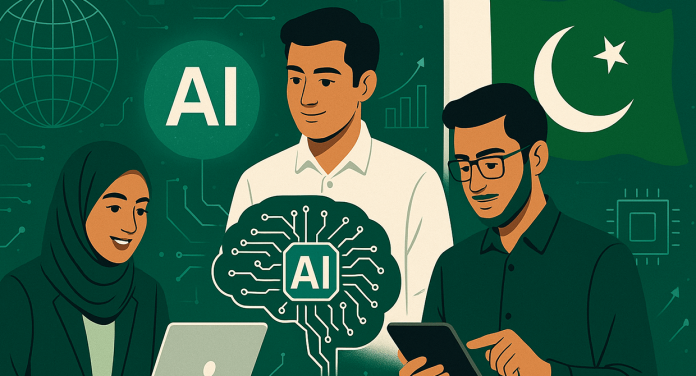ISLAMABAD, Jul 31 (APP):Federal Minister for Information Technology and Telecommunication, Shaza Fatima Khawaja, said on Thursday that Pakistan’s first National Artificial Intelligence (AI) Policy would pave the way for the country’s entry into a new digital era.
The Federal Cabinet has unanimously approved the National AI Policy 2025, which aims to establish a comprehensive AI ecosystem in Pakistan. The policy aimed to democratize access to artificial intelligence, enhance public services, and open up new employment and innovation avenues.
The AI policy outlines training 1 million AI professionals by 2030, establishing an AI Innovation Fund and AI Venture Fund to boost private sector involvement, creation of 50,000 AI-driven civic projects and 1,000 local AI products in the next five years, distribution of 3,000 annual AI scholarships and facilitation of 1,000 research projects, inclusion of women and differently-abled individuals through accessible education and financing, strengthening cybersecurity and national data security protocols, promoting global partnerships and compliance with international AI regulations.
While briefing the media, the minister of IT congratulated the people of Pakistan, especially the youth, and said this policy is more than just a step into modern technology—it is a major change that will improve many areas of life, including health, education, industry, trade, and the economy.
“This policy is meant to benefit all citizens. It’s part of Prime Minister Shehbaz Sharif’s vision for a ‘Digital Pakistan’ and follows his instructions to modernise the country’s economy and governance using digital tools,” she said.
She thanked the cabinet, national institutions, and the Prime Minister for their support, noting that the policy was created with input from various government bodies, including the Pakistan Armed Forces and the Special Investment Facilitation Council (SIFC).
Shaza Fatima said the policy is now ready to be put into action and promised that it will help turn Pakistan into a strong player in the AI world. “With clear planning and strong implementation, we aim to join the ranks of leading tech-driven countries,” she added.
She shared that the government would launch an AI Innovation Fund and an AI Venture Fund to support new ideas, startups, and especially projects led by young people. The goal is to promote innovation, entrepreneurship, and create specialised AI centers to spread technology nationwide.
The minister said the policy also focuses on AI education, not only in schools and universities but also for professionals and businesspeople.
She stressed the need to teach people the skills required in today’s rapidly changing job market.
On cybersecurity, she said the policy includes steps to ensure AI is used safely and responsibly. It aims to protect citizens’ data and digital systems from cyber threats, which are growing with increased digitalisation.
She explained that AI will be introduced in all sectors to boost productivity, improve governance, and grow the economy. Special care will be taken to protect vulnerable groups such as children, women, and marginalised communities from harmful online content.
A key goal of the policy is to make AI accessible to everyone. “No one should be left behind as we move into an intelligent world,” she said, noting that the government will launch projects to bring AI services and education even to remote and underdeveloped areas.
Shaza Fatima also pointed out that Pakistan needs strong infrastructure like data centers, cloud services, and advanced computing to support the AI revolution.
She said that Pakistan has already launched the Pak-China data transit system, which could turn the country into a key regional hub for internet traffic between Central Asia and China via Karachi.
The policy also supports building local AI tools, including a national Large Language Model (LLM). “Young people are already using tools like ChatGPT. It’s important for us to create our own AI systems that reflect our culture, religion, language, and identity,” she said.
Shaza Fatima warned against depending too much on foreign AI models that may not include Pakistan’s viewpoints. She said it is important for the country to feed its values and narratives into AI systems to preserve its identity.
The minister urged young people and professionals to actively take part in building Pakistan’s digital future.
She said that if Pakistanis don’t add their voices to global AI systems, the country could be left out of important technological developments.
Shaza Fatima highlighted the importance of international partnerships.
She said the policy was created with help from local experts and foreign partners, whose technical support and cooperation were essential in designing Pakistan’s AI roadmap.

















